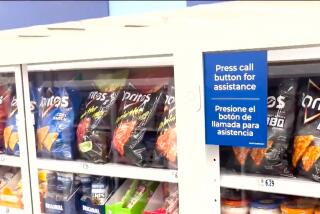Wal-Mart Can Attract Revenue -- and Crime
HARRISVILLE, Utah — For the tiny police force in this bedroom community, the south end of town never caused much bother. Horses grazed in the green pastures, and for years, two solitary bars provided the only late-night distractions for those who needed something to do.
That was before early 2001, when Wal-Mart opened a 24-hour Supercenter that swallowed all 212,000 square feet of rural fields.
Since then, police in Harrisville, population 4,000, about 45 miles north of Salt Lake City, have been forced to confront big-city realities.
The most serious incident happened in the store in January, when an officer shot and wounded a man who pointed a fake gun at him.
As the world’s largest retailer puts its stamp on rural communities, some towns are discovering that while the 24-hour big-box store may bring financial benefits, they go hand in hand with an unintended consequence: the increased burden on law enforcement.
In three years, calls to Harrisville police jumped by a third. The department hired two more officers -- bringing the total to six -- and the court schedule was extended to allow the city prosecutor time to negotiate pleas.
Wal-Mart’s vast parking lot, where more than half the investigations for driving under the influence originate, is patrolled overnight. Drug DUI arrests outnumber those involving alcohol more than 2 to 1.
“Our DUIs skyrocketed. It just went through the roof,” Officer Nate Thompson said on a Friday night when more than 100 cars remained in the parking lot after midnight.
The problem is apparent 15 miles away in Clinton, a town of 18,000 whose size nearly doubles each day because of the Supercenter, one of Wal-Mart’s 19 discount store-supermarket hybrids in Utah and 1,400 nationwide.
“You just about name it,” Police Chief Bill Chilson said. “Shoplifting, fraud scams; we’ve had DUI, traffic accidents, medical situations. We haven’t had any shootings yet.”
There was even a domestic violence arrest after the store’s surveillance cameras captured a man punching his wife.
Before Wal-Mart opened, Chilson asked neighboring police what to expect. “They laughed at me,” he recalled. A judge from another town asked him: “Have you been Wal-Mart-ized yet?” before recounting how his courtroom had been “inundated” by crimes originating at the store.
In some towns nationwide, law enforcement agencies have even opened substations in the store to better respond to the increased activity.
The Bentonville, Ark.-based retailer says it works closely with police on crime-prevention measures, including staff training and community outreach. Each store has undercover security, many of them former officers.
A representative denied that Wal-Mart brings increased crime and attributed any extra police calls to the store’s aggressive policy toward shoplifters.
“You’re going to see an increase in reporting of shoplifting calls and that goes back to our policy of zero tolerance,” spokeswoman Sharon Weber said.
Wal-Mart is a “social gathering place,” but it’s unfair to blame the store for the actions of a few, she said. “We trust that our customers will be responsible and polite, and for the most part, we have wonderful customers who do that.”
Although the stores have been criticized for attracting traffic, creating low-wage jobs and destroying neighboring businesses, the effects on local police have drawn little attention.
“Within the last few years, we’ve seen a growing number of towns around the country that accept this kind of big-box sprawl and discover afterward that they’re really quite costly from a public service standpoint,” namely policing and roads, said Stacy Mitchell, a senior researcher with the Minneapolis-based Institute for Local Self-Reliance, a nonprofit research and educational organization.
Wal-Mart attracts loiterers with nothing better to do, some critics say.
“Kids are just plain bored -- they find more things to do there,” said Alice Brando, a clerk for the Lakewood-Busti Police Department in western New York’s Chautauqua County.
“It’s obvious that it’s going to add more calls, more people, more traffic, more accidents. I mean, it doesn’t take anyone in law enforcement to figure that out,” said Sheriff Eddie Cathey of Union County, N.C., who planned to address the issue at a county planning board meeting.
Chief John Slauch of the West Sadsbury Township Police Department in rural Pennsylvania made his own observations after Wal-Mart became the anchor store in a new development in 2002.
“We saw a significant increase in crime and incident calls for service from the day Wal-Mart opened,” he said.
Misdemeanor crimes jumped 55% from 2001 to 2003; calls for service increased 57% from 2002 to 2003.
Municipal taxes don’t cover the extra costs incurred by the eight-member police force, Slauch said.
“I really don’t think Wal-Mart is concerned with what happens on the local level; they’re concerned with how much money they’re making,” he said. “They’re not looking at the burden they’re creating.”
But the problem is not felt everywhere. The majority of the more than 30 small to mid-sized agencies around the country interviewed said they were able to effectively handle the extra workload that Wal-Mart brought. Six reported no corresponding crime spike and only negligible increases in calls to police.
Overwhelmingly, police chiefs defended Wal-Mart as an asset that helped law enforcement. They said it provided full access and information for investigations and grants to fund police projects -- to say nothing of the tax benefits to the city.
“Thank goodness for Wal-Mart, that’s all I can say,” Harrisville Mayor Fred Oates said. “Any mayor in the United States who had the opportunity would be glad to have a Wal-Mart.”
Harrisville earns about $60,000 in monthly sales taxes from Wal-Mart, Oates estimated. That figure will jump 40% after an access road to the store is paid for out of sales tax revenue this year.
Thompson and Police Chief Max Jackson also defend Wal-Mart as “good partners.” The store donated funds for a bike patrol program, firearms, computers in patrol cars, and training materials and equipment.
Still, Jackson recognizes the significant effect it has on small police agencies, and intends to discuss it at the next board meeting of the National Center for Rural Law Enforcement.
As for Thompson, the added work produced an unexpected bonus. In 2002, he was named Utah Peace Officers Assn. officer of the year.
“It was based on the amount of arrests I made -- basically because of Wal-Mart.”
More to Read
Inside the business of entertainment
The Wide Shot brings you news, analysis and insights on everything from streaming wars to production — and what it all means for the future.
You may occasionally receive promotional content from the Los Angeles Times.










